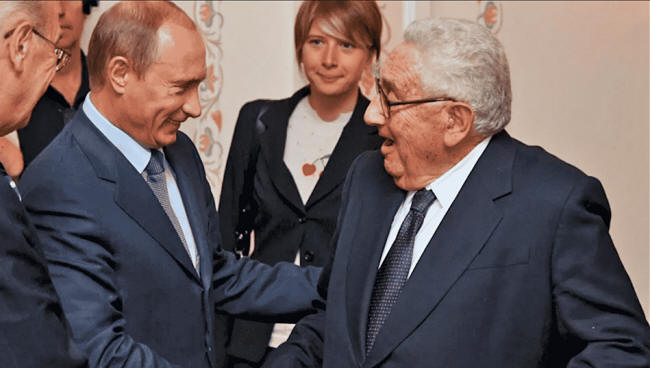|
Italian
version Russia invasion war food prices oil Europe sanctions Zelensky
EPA/SERGEI CHIRIKOV
Veteran U.S. statesman Henry Kissinger has urged the West to stop trying to inflict a crushing defeat on Russian forces in Ukraine, warning that it would have disastrous consequences for the long term stability of Europe.
The former U.S. secretary of state and architect of the Cold War rapprochement between the U.S. and China told a gathering in Davos that it would be fatal for the West to get swept up in the mood of the moment and forget the proper place of Russia in the European balance of power.
Dr. Kissinger said the war must not be allowed to drag on for much longer, and came close to calling on the West to bully Ukraine into accepting negotiations on terms that fall very far short of its current war aims.
He told the World Economic Forum (WEF) that Russia had been an essential part of Europe for 400 years and had been the guarantor of the European balance of power structure at critical times.
European leaders should not lose sight of the longer term relationship, and nor should they risk pushing Russia into a permanent alliance with China.
The comments came amid growing signs that the Western coalition against Vladimir Putin is fraying badly as the food and energy crisis deepens, and that sanctions may have reached their limits.
...in an angry outburst in Davos, accusing Hungary and other recalcitrant states of paralyzing attempts by the rest of the EU to craft a full-fledged oil embargo.
Mr. Habeck, who doubles as economy minister, said Germany is more or less ready to endure the shock of a total cut-off in Russian oil imports but others want to carry on as if nothing had changed.
Yuriy Vitrenkio, head of the Ukrainian energy consortium Naftogas, said the refuseniks are demanding exemptions from the embargo on false pretences.
Eleven Republican senators and 57 congressmen in the U.S. voted against the colossal $40bn aid package for Ukraine, an early sign of fragmenting cohesion in Washington.
Nobody is sure,
The fundamental divisions over the West's war aims in Ukraine have so far been masked by an outpouring of solidarity and emotion, but these rifts are coming to the fore.
President Volodymyr Zelensky delivered his usual tour de force in a video address to the forum, saying,
If it does, he added with his trademark touch,
Yet he also said Russia should be shut out of the civilized world entirely, and that all trade should stop until Russian forces are driven from Ukraine.
It is doubtful whether the West can maintain a united front in pursuit of such far-reaching war aims with absolutist aims.
Mr. Cantor said it would require secondary sanctions against other countries, putting the West in a head on clash with China, India, and almost 60 states that refused to back a UN resolution denouncing Russia's invasion.
India's energy minister Shri Hardeep Puri brushed aside suggestions that his country should stop buying Russian oil.
Mr. Cantor said the U.S. was in danger of overplaying its hand.
The U.S. Congress is split on the ultimate war aim.
Senator Joe Manchin said the U.S. should keep going until there was a clear "win" that restored all of Ukraine's territory and led to the toppling of Vladimir Putin but other members of the Congressional delegation in Davos want a negotiated outcome...
Saudi Arabia and the Opec states have made it clear that they will not draw on their spare capacity to cover the lost Russian supply of oil, estimated at around one million barrels a day at the end of April.
This makes it extremely hard to plug the gap if Europe cuts off purchases of Russian barrels.
Francisco Blanch from Bank of America said the oil market is now extremely tight.
Unless there is a global recession and violent demand destruction, crude prices could soon spiral higher.
Mr. Birol said that the OECD bloc of rich states are releasing 1.5m barrels a day of oil to stabilize the market, and have so far depleted 9% of their stocks.
This is before the European embargo against Russia even begins.
|


